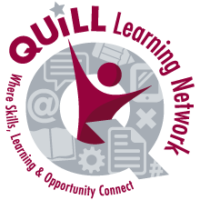- Initial Assessment: A Policies and Best Practices Guide for Literacy and Basic Skills
- Assessment Tool Database
- IELTS Reading and Writing Prep Curriculum, March 2024
- Job Search Companion Resource
- LBS Data Definitions Guide, March 2024
- Organization Needs Assessments, QUILL Learning Network, March 2024
- Report: Introducing Universal Design for Learning (UDL) and Artificial Intelligence (AI) in LBS
- LBS Pathway to Supporting ESL Learners in Rural Ontario, March 2023
- Organizational Needs Assessments, QUILL Learning Network, March 2023
- Job Search Resource Manual and Answer Guide for connect2jobs.ca , March 2023
- Digital Literacy Library, 2021
- Digital Skills Promotion Tookit – 2021
- LBS: We’re All in this Together – Best Practices in Adult Literacy Program Delivery during the COVID-19 Pandemic – April 2021
- Apprenticeship Resources for LBS in the QUILL Region Google Site – 2019
- Soft Skills Resources Google Site – 2018
- Step By Step To Success In Transition-Oriented Program – Resources
- Common Assessment for the OALCF Goal Path Resource
- EmployAbility Success! Essential Skills at Work
- Recognizing Life’s Work: Helping Learners Connect Their Essential Skills From Home to Work
- Through the Worker’s Eyes: Developing Learning Activities With Work-Related Documents
- Labour Market Partnership Project – Mastering the Puzzle Pieces, 2013-2015

Initial Assessment: A Policies and Best Practices Guide for Literacy and Basic Skills
This guide draws on the information gathered during 4 working group meetings facilitated for Literacy and Basic Skills (LBS) practitioners in 2024. It includes information that can be used to develop assessment policies for LBS organizations and assessors. It also includes assessment best practices covering all stages of the assessment process.
Assessment Tool Database
This spreadsheet lists assessments that have been used by Literacy and Basic Skills (LBS) organizations across Ontario. It is a resource that can help LBS agencies find and select assessments that will meet the specific needs of their learners. It can also be used to onboard new LBS practitioners.

IELTS Reading and Writing Prep Curriculum Resource, March 2024
This resource provides curriculum LBS practitioners can use to help language learners understand the format of, and prepare to take the IELTS Test. The IELTS Test is a formal English Language proficiency test aimed at people who want to study in an English-speaking environment, work in or emigrate to an English-speaking country, or get a higher-end job where English proficiency is a requirement.
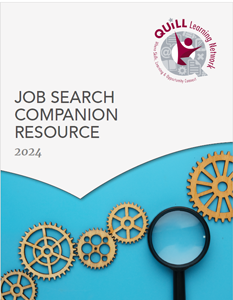
Job Search Companion Resource
This manual provides additional resources and online activities for LBS practitioners to use with learners on an employment goal path who are exploring current job postings and in-demand skills. This includes learning about outlooks and projections for jobs in Ontario, and understanding how supply and demand impact the labour market.
LBS Data Definitions Guide, March 2024
This resource provides a standardized set of definitions for the terms that Literacy and Basic Skills (LBS) organizations see on program forms and in the EOIS CaMS database. It will be helpful when onboarding new LBS practitioners and CaMS administrators, to build data consistency across the province, provide a common language in LSP meetings, and guide reports to the ministry.
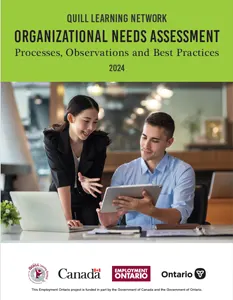
Organization Needs Assessments, QUILL Learning Network, March 2024
Following the successful completion of the pilot project (October 2022-March 2023), QUILL continued working with local employers on the Skills for Success Workplace Literacy initiative until March 2024.
The extension of this project allowed us to refine processes and best practices for conducting Organizational Needs Assessments in this region. These observations and conclusions are summarized and highlighted in this report.
While the current project has come to a close, QUILL staff remain available to discuss employer training needs and recommendations based on the information gathered throughout this project.
Please contact execdir@quillnetwork.com for more information.
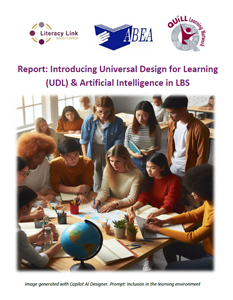
Report: Introducing Universal Design for Learning (UDL) and Artificial Intelligence (AI) in LBS
This report contains recommendations and tips for using UDL and AI in LBS based on two webinar presentations in 2023-24 and participant feedback.
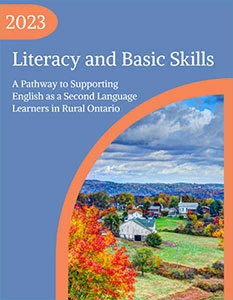
LBS Pathway to Supporting ESL Learners in Rural Ontario, March 2023
This report explores the gap in language training service in rural Ontario communities (under 30,000) and the resulting impact on Literacy and Basic Skills (LBS) service providers. It uncovers barriers and challenges faced by LBS agencies being asked to fill the gap in service, and shares best practices, assessment tools and resources, as well as some key recommendations for systemic changes in LBS which will make it easier for them to do so.
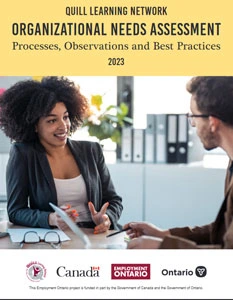
Organizational Needs Assessments, QUILL Learning Network, March 2023
This report summarizes key goals, approaches, and conclusions from the Skills for Success Workplace Literacy pilot project that was undertaken by QUILL in 2022-2023.
Based on this pilot, best practices have now been established which will enable QUILL to more effectively conduct organizational needs assessments in 2023-2024.
If you are interested in working with QUILL to conduct an Organizational Needs Assessment of your business, please contact execdir@quillnetwork.ca
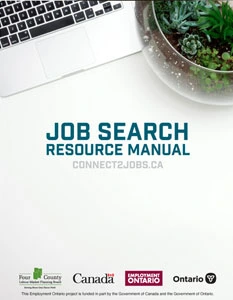
Job Search Resource Manual and Answer Guide for connect2jobs.ca , March 2023
Created by the Four County Labour Market Planning Board in partnership with QUILL Learning Network, this manual contains activities to help job seekers in Bruce, Grey, Huron, and Perth counties learn how to use local labour market information and job search tools available on the connect2jobs.ca website. It can be used independently by job seekers or in an LBS classroom by learners on an employment goal path.
Digital Literacy Library, 2021
This google site houses links to online resources and tools that LBS educators can use to enhance learner engagement and learning online, or to access professional development to build their own digital literacy skills.
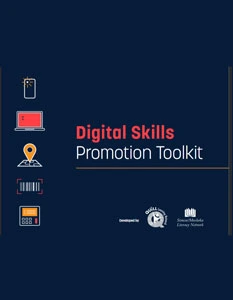
Digital Skills Promotion Toolkit – 2021
This resource is the result of collaborative effort between QUILL Learning Network and Simcoe Muskoka Literacy Network (SMLN). It is meant to help your agency identify what digital skills are required for entry-level jobs in your area so you can create and promote programming to address the need in your clientele. You can use the resources in this toolkit through social media, posters, and communication with employers to promote your ability to help clients improve their digital skills.
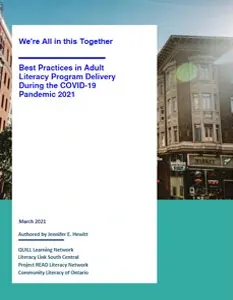
LBS: We’re All in this Together – Best Practices in Adult Literacy Program Delivery during the COVID-19 Pandemic – April 2021
QUILL received Ministry of Labour, Training, and Skills Development funding for a project to collect and collate best practices on serving clients and taking care of staff during the COVID-19 pandemic.
QUILL collaborated with project partners Project READ, Literacy Link South Central and Community Literacy of Ontario to gather this information.
- Report – Best Practices in Adult Literacy Program Delivery during the COVID-19 Pandemic
- Webinar – We’re All in this Together
- ASL Interpretation – Webinar – We’re All in this Together
- Slide deck – We’re All in this Together
- Finches de conseils – Français
- Information from webinar chats – We’re All in this Together
- Learning Resources Tip Sheet
- Communicating With Learners Tip Sheet
- Marketing Tip Sheet
- Engaging Volunteers Tip Sheet
- Mental Health Tip Sheet
- Help Learners Access Devices and Internet Tip Sheet
- Professional Development Tip Sheet
Apprenticeship Resources for LBS in the QUILL Region Google Site – 2019
This site exists to provide information and resources to the literacy and basic skills (LBS) instructors working with learners interested in the apprenticeship goal path. Trades profiled here will be needed within the QUILL region for work in the nuclear industry, as well as other industries.
Soft Skills Resources Google Site – 2018
The Learning Networks have created this site to host resources to build the soft skills of our learners. We created it to:
- assist LBS programs in documenting what they already do to increase learners’ soft skills.
- identify community partnerships that show some good practices related to soft skill development.
- provide some resources to LBS programs that may want to increase their soft skill programming.
Step By Step To Success In Transition-Oriented Program – Resources
LBS programs are working to attain the “Fully in Place” marker in the Ministry’s Agency Self-Assessment tool for implementing the Ontario Adult Literacy Curriculum Framework. Simcoe/Muskoka Literacy Network (SMLN) and QUILL interviewed LBS programs, across the province, who are “Fully in Place” to gather their best practices and samples of their documents.
- Presentation with notes – Step by Step to Transition-oriented Programming (PowerPoint)
Updated Community Literacy of Ontario OALCF Tracking form
SMLN and QUILL have updated this tracking form with permission from Community Literacy of Ontario (CLO). It now includes all the examples that we received from programs across the province.
Coming soon!
Sample documents from the webinar
- CLA Learner File Checklist
- CLA Learner Progress Tracker Template
- Outreach Literacy – Checklist transition SSC
- KL&S – Flyer for Health Services panel presentation
- KL&S – Sample Congratulations referral
- TVLA – Learner File Summary
Other samples received when researching best practices
Community Learning Alternative
Georgian College – Barrie Campus
Kingston Literacy & Skills
- KL&S – Additional Information Form
- KL&S – Essential Skills Profile
- KL&S – Goal-directed Learner Plan
- KL&S – Handyperson Special
- KL&S – Online Guide_Sept 2017
- KL&S – Volunteering Curriculum Handbook
Outreach Literacy
Tri-County Literacy Council
- Tri-County Literacy Council and ES Referral Protocol
- Tri-County Literacy Council Exit Package
- Tri-County Literacy Council Referral Protocol
Trent Valley Literacy Association
We would like to thank all the LBS program staff who participated in our research.
- Lesley Hamilton, Trent Valley Literacy Association – Peterborough
- Pat Whittington, Georgian College – Simcoe Co., Orangeville, Owen Sound
- Vandra McQuarrie, Literacy Nipissing – North Bay
- Joyce Bigelow, Connections Adult Learning Centre – Sharbot Lake
- Kim Sawyer, Canadore College – North Bay
- Judy DesRoches and Karena Persault, Barrie Literacy Council
- Stacey McQuoid, Community Learning Alternative – Trenton
- Trish Daubs, Lambton Kent District School Board
- Chris Mitchell-Kidd and Sara Brown, FIP-Northern College – Cochrane
- Rick Townend, Pinar Shakir and Kate Wypior, Fanshawe College
- Daniel Russell-Matthews, Thunder Bay Literacy Group
- Wendy Olsen, Dryden Literacy Association –
- Debbie Hamilton, Outreach Literacy – John Howard Society of Kawartha Lakes & Haliburton (Minden)
- Martha Rudden, Kingston Literacy and Skills
- Roger Hannon, Grey Bruce Georgian Adult Learning Centre
- Carol Sproat and Yvonne Thompson, Adult Learning Programs of Perth
- Charlotte Parliament, Simcoe County District School Board
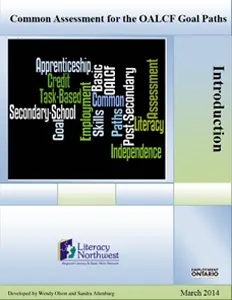
Common Assessment for the OALCF Goal Path Resource
Here is the OALCF Common Assessment Resource Tool created by Literacy Northwest
Common Assessment Strategy – print on legal sized paper
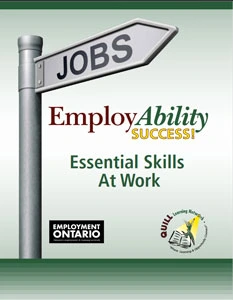
EmployAbility Success! Essential Skills at Work
QUILL Learning Network has created EmployAbility Success! Essential Skills at Work in response to the literacy field’s need for more workplace materials that incorporate Essential Skills. With EmployAbility Success! students are able to read about workers in four different entry level jobs and practice the Reading, Document Use and Numeracy skills that are needed for many of their job tasks.
EmployAbility Success! uses genuine workplace scenarios and engaging characters so that students will be encouraged to enter into an authentic work-like experience. Students will:
- read authentic workplace scenarios that enable them to understand how Essential Skills are needed on the job
- learn how workers in each scenario use specific Essential Skills
- practice using the Essential Skill in a similar job task
- reflect on workplace realities with questions, special Workplace Know-How information boxes and discussion opportunities
- complete Overtime Activities that reinforce the Essential Skill already used
- self-Assess on the Essential Skills used in each chapter before and after each module
Ontario Practitioners!
We have also created a Relationship Matrix that shows you the relationship between the job tasks in EmployAbility Success! and the Ontario Adult Literacy Curriculum Framework (OALCF). The matrix will help you to easily identify how the job tasks in EmployAbility Success! support specific competencies within task groups in the OALCF. It uses the same colour code as the OALCF for quick and easy reference.
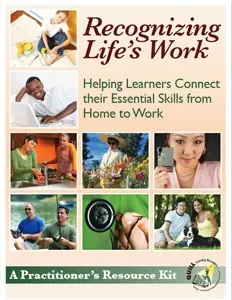
Recognizing Life’s Work: Helping Learners Connect Their Essential Skills From Home to Work
Recognizing Life’s Work: Helping Learners Connect Their Essential Skills from Home to Work – A Practitioner’s Resource Kit” highlights the Essential Skills (ES) developed and strengthened through 12 different common leisure and home-based-activities. The kit is a comprehensive bank of materials that include high and low-level learning activities, authentic documents, steps to the answers to the learning activities, and fictional ‘day-in-the-life of a job’ case studies. The tools help practitioners and their learners make the link between the most important Essential Skills used in leisure activities to occupations that also require the same Essential Skills. This resource provides credibility, validity and recognition to the Essential Skills that adults develop and strengthen through daily home and life activities and emphasizes that adult learners with no, or limited, work experience, still have a wealth of knowledge, skills and experience to bring to the workplace.
The Most Important Essential Skills database (designed for use specifically with this project) is in Word to assist practitioners in easily identifying the occupations pastimes are linked to. For instructions see page 264 of the resource.
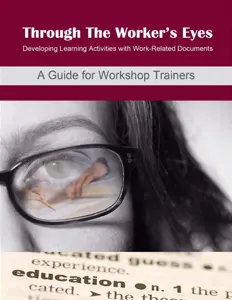
Through the Worker’s Eyes: Developing Learning Activities With Work-Related Documents
This guide is part of a trainer’s kit developed and distributed by QUILL Learning Network. Trained facilitators have committed to use this guide when delivering the workshop “Through the Workers Eyes: Developing Learning Activities with Work-Related Documents”. They will deliver the workshop in literacy network regions across Ontario in an effort to:
- help build the capacity of workforce and workplace literacy instructors
- provide instructors with training, tools, and strategies for using authentic documents and developing learning activities
To find a trained facilitator near you, contact QUILL.
Labour Market Partnership Project – Mastering the Puzzle Pieces, 2013-2015
Coordinating to bring low-literacy and marginalized clients employment
In 2013-2015 the Learning Networks of Ontario – Western Region received Labour Market Partnership funding to research and create resources for the Literacy and Basic Skills programs to assist low-literacy and marginalized clients to employment. QUILL worked on strengthening service coordination in 3 multi-service centres in the region. Those sites were
- Kincardine – Lake Huron Learning Collaborative
- St. Marys – The Education and Employment Centre
- Stratford – Stratford Career Centre
QUILL worked with the community partners working out of each site and held focus groups with clients using the sites to ensure that services between community partners were coordinated and reduced duplication for the clients.
Here are links to the resources created by QUILL in this project.
Webinar describing the project – Mastering the Puzzle Pieces – Relationship Building
Kincardine
We created a notepad with avatars of the community partners staff to assist staff in explaining to clients about the different services at the site. The group also created posters with client’s testimonials to post on site and in other community partners offices like Ontario Works. Finally, a Memorandum of Understanding was created to outline the roles and responsibilities of each organization working at the site.
St. Mary’s
At the St. Marys Centre we held a focus group with the clients. The remarked on how well services were coordinated at the site.
Report from St. Marys Focus Group
Stratford
In Stratford we designed a number of tools for the multi-service centre to use.
“Congratulations on your excellent e-publications: Through the Worker’s Eyes: Developing Learning Activities with Work-Related Documents, and Recognizing Life’s Work: Helping Learners Connect Their Essential Skills from Home to Work. As someone relatively new to the area of essential skills, I found these to be two of the best resources I came across in my research.”
Sandra Loschnig, writer/researcher for Literacy Alberta
Contact QUILL for more information about these resources or to find additional materials.
